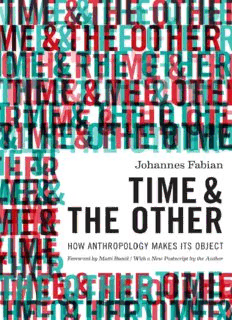
Time and the other : how anthropology makes its object PDF
Preview Time and the other : how anthropology makes its object
Time and the Other Time and the Other HOW ANTHROPOLOGY MAKES ITS OBJECT Johannes Fabian COLUMBIA UNIVERSITY PRESS NEW YORK Columbia University Press Publishers Since 1893 New York Chichester, West Sussex cup.columbia.edu Copyright © 2014, 2002, 1983 Columbia University Press Postscript © 2006 Sage Publications All rights reserved E-ISBN 978-0-231-53748-3 Fabian, Johannes. Time and the other : how anthropology makes its object / Johannes Fabian p. cm. Includes bibliographical references and index. ISBN 978-0-231-16926-4 (cloth : alk. paper) — ISBN 978-0-231-16927-1 (pbk. : alk. paper) — ISBN 978-0-231-53748-3 (e-book) Library of Congress Control Number : 2013953081 A Columbia University Press E-book. CUP would be pleased to hear about your reading experience with this e-book at cup- [email protected]. Cover design by Anna Fabian Contents Foreword: Syntheses of a Critical Anthropology, by Matti Bunzl Preface to the Reprint Edition Preface and Acknowledgments Chapter 1: Time and the Emerging Other From Sacred to Secular Time: The Philosophical Traveler From History to Evolution: The Naturalization of Time Some Uses of Time in Anthropological Discourse Taking Stock: Anthropological Discourse and Denial of Coevalness Chapter 2: Our Time, Their Time, No Time: Coevalness Denied Circumventing Coevalness: Cultural Relativity Preempting Coevalness: Cultural Taxonomy Chapter 3: Time and Writing About the Other Contradiction: Real or Apparent Temporalization: Means or End? Time and Tense: The Ethnographic Present In My Time: Ethnography and the Autobiographic Past Politics of Time: The Temporal Wolf in Taxonomic Sheep’s Clothing Chapter 4: The Other and the Eye: Time and the Rhetoric of Vision Method and Vision Space and Memory Logic as Arrangement: Knowledge Visible Vide et Impera: The Other as Object “The Symbol Belongs to the Orient”: Symbolic Anthropology in Hegel’s Aesthetic The Other as Icon: The Case of “Symbolic Anthropology” Chapter 5: Conclusions Retrospect and Summary Issues for Debate Coevalness: Points of Departure Postscript: The Other Revisited Notes References Cited Index Foreword / Syntheses of a Critical Anthropology FIRST PUBLISHED IN 1983, Johannes Fabian’s Time and the Other ranks among the most widely cited books of a critical anthropology that has, in the course of the past two decades, gradually moved into the center of the discipline. But like other canonical texts written in this tradition (cf. Clifford and Marcus 1986; Marcus and Fischer 1986; Clifford 1988; Rosaldo 1989), Time and the Other continues to hold theoretical relevance, retaining the radical flavor of an urgent polemic. Praised by many as a path-breaking critique of the anthropological project, while met with apprehension by others in light of its uncompromising epistemological stance, it has become a fixture in the theoretical landscape of contemporary anthropology. The following introduction leads from an exposition of the book’s argument and an analysis of its relation to Fabian’s earlier writings to its contextualization in the critical anthropology of the 1970s and early 1980s. The piece concludes with a brief overview of anthropological developments in the wake of the initial publication of Time and the Other. The Argument Time and the Other is a historical account of the constitutive function of time in Anglo-American and French anthropology. In contrast to prominent ethnographic accounts of culturally determined temporal systems (cf. Evans-Pritchard 1940; Bourdieu 1977), Fabian’s critical project operates on a conceptual level, interrogating and problematizing the deployment and uses of time as such. In this sense, Time and the Other functions both as a meta-analysis of the anthropological project at large and as a deconstruction of its enabling temporal formations.
Description: